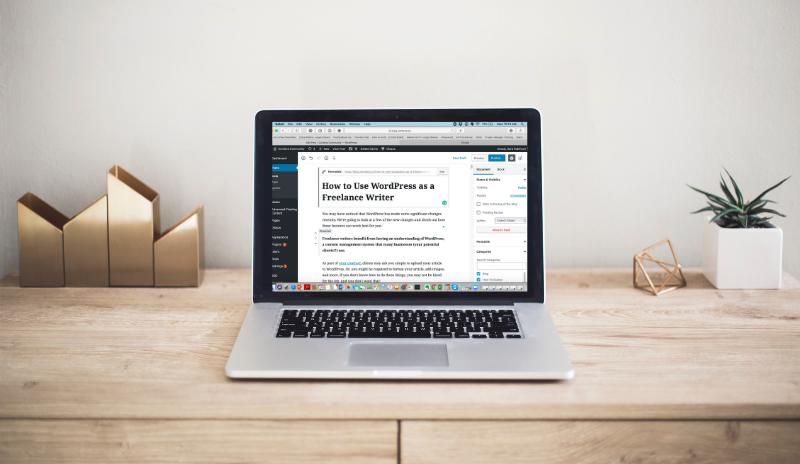So, you want to be a freelance writer.
But you also have a full-time job.
That’s awesome.
But, it also requires some planning and organization to be a freelancer and have a full-time job.
First, assess your goals
Are you wanting to start freelance writing because you want to write (and getting paid to write would be nice), or as a side-hustle to make money, but you don’t plan to make it into a full-time thing?
Or, are you starting freelancing with the hope that you can ditch your current job?
Neither goal is right or better, but how you approach your freelancing may differ depending on what your goals are.
When will you work?
If you have a full-time job, there are only so many other hours that you can write or look for writing jobs. But, there are still plenty of hours.
The obvious choices are before you go to work, after work, sometimes lunch, and on the weekends (or whatever your days off are).
If you’re looking to add in a bit of freelance writing, you won’t need too many available hours- you can search for work when you feel like it, making time for assignments when they come in.
However, if your hope is to build your freelancing business so that you can leave your full-time job, you may want to use most of your free time to pursue your freelance writing biz.
You can definitely do that, but don’t sacrifice things like sleep and taking care of yourself to work full time and try to freelance all. the. time. You’ll end up doing sub-par work in both areas, which would be very problematic.
If you are starting freelance writing on the side, with the hope that you will eventually leave your current job, look at your typical weekly schedule. Look at how many hours you work, including your commute. Consider how much sleep you need, how many hours you exercise, and have other commitments you want to keep up with, like seeing friends, or other family commitments.
Then, you can really see how much time you have left to spend building your freelance writing biz. You can then get organized for how you’d like to spend your time. In the beginning, you’ll likely spend much of that time looking for jobs and pitching potential clients, and over time, you’ll spend more available time writing. You may also want to research more about how to be a freelance writer. (Make sure you go through the training in Contena Academy if you’ve signed up).
Don’t forget to include time for administrative type tasks like invoicing and submitting assignments.
Consider when work may get in the way of freelance writing
Depending on the type of writing you do, your full-time job may or may not be an issue. For example, with the type of content I create, I can work whenever I want. The research I do is on the internet, and generally not with sources. When I do need a source, I can usually send an email.
But- if you’re doing more traditional journalism, where communication with sources is needed, or you want to cover local news or timely events, then that day-job could be a hindrance.
I’ve heard of writers telling their bosses that they have an appointment or taking a personal day to cover an assignment, but this probably isn’t a great habit to get into, especially if you’d like to keep that job.
A full-time job and freelancing often work well together, but there may be times where the two conflict, so try to predict that and figure out potential solutions in advance.
Check in with your work-work-life balance
A challenge of having more than one job is that life can get out of balance very easily if you’re not keeping track of how you’re spending your time, and especially if you’re not taking care of yourself. You already have a full-time job, and now you’re adding another job on top of that.
Balance can get out of whack.
And, with freelance writing, you can always look for more work, pitch more people, and ideally, have more clients to work with. As fantastic as this can be, it may not be positive overall if you get burnt out or overly stressed.
So, while working full-time and freelancing can start off feeling balanced, it doesn’t take much to shift things off-balance.
I say this not to scare you away from trying it- the opposite, really.
Awareness is important.
If you make the decision to freelance on top of what you’re already doing, be aware of your time, your schedule, and how you’re feeling about everything. Continue to monitor that, and before you feel (totally) overwhelmed, adjust.
This is where it’s useful to revisit your goals and make adjustments according to those goals. For example, if you don’t plan to leave your current job, cut back time spent on searching for work, and focus on the assignments you have.
If you do want to leave your job, be very diligent with how you spend your job search time (Contena is great for this), and check in with your organization and systems so you’re not wasting your time anywhere.
You may also need to look where else you can find more time.
For example, are you wasting time on social media when you could be completing the work you’ve found?

If you want to transition out of your job, create a plan
When your goal is to leave your job and be a freelance writer, it’s a good idea to have a plan. For example, what’s your ideal timeline? And what do you need to have in place before that happens? Financially, what are the circumstances that make this transition a good choice for you, and what do you need to take care of (like health insurance) when you leave your job.
Keep in mind that it can be useful to have a transitional job in between working full-time and purely being a freelance writer. For example, finding a part-time job can help ease the transition and the unpredictable nature of freelance writing.
A part-time job allows you to have more time to work and build your business while still giving you some consistency with pay, and possibly some benefits. Many freelance writers (like me) make a living doing more than writing. I make a good amount of my income from being a project manager and blog content manager.
Or, consider a side-hustle in addition to writing. These additional jobs don’t mean you’re not successful as a writer, but rather, create a good situation for you to build your business and become successful.
The bottom line is that you can have a full-time job and still freelance write.
However, there may come a point where you have to look at the balance that exists. If things are going well with freelancing (and we hope that they do!), then you may have to examine if the full-time job is what’s best.
Or, if you want (or need) the full-time job, then you have to look at how freelancing fits in.
There are literally no right answers for any of this. It depends on your individual situation.
We hope that you build freelance writing into whatever you want it to be, knowing that it can be done even when you have a full-time job.










